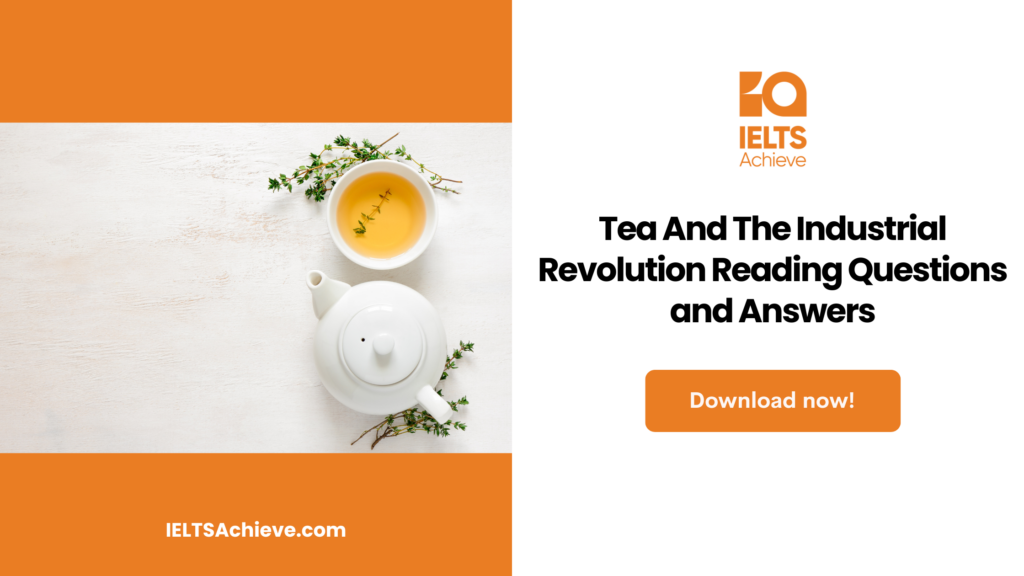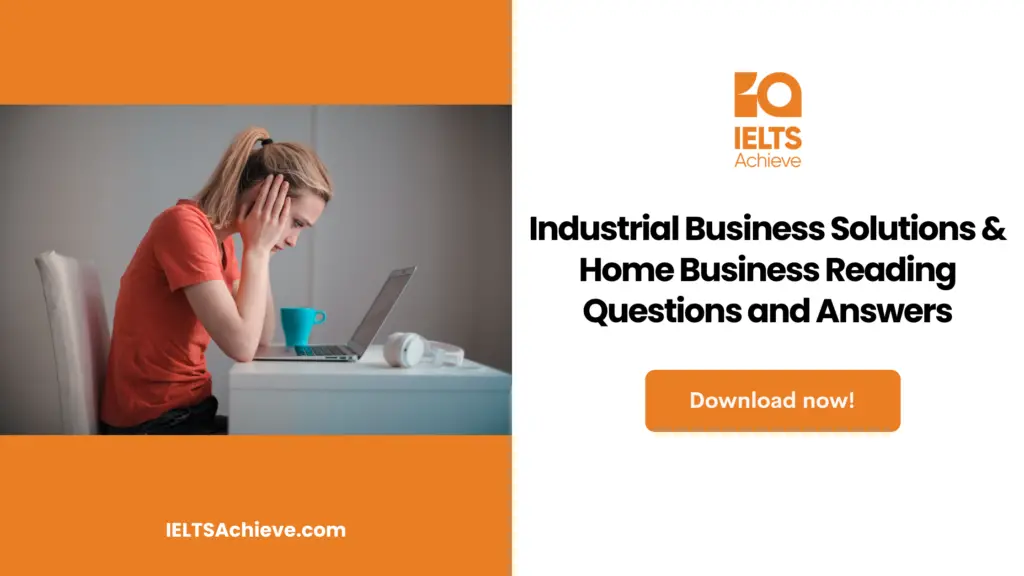The Blog post contains the following IELTS Reading Questions:
- IELTS Reading Matching Headings
- IELTS Reading True/False/Not Given
Stay informed and prepared for success – Explore our comprehensive Reading Test Info page to get valuable insights, exam format details, and expert tips for mastering the IELTS Reading section.
IELTS Reading Passage: Tea And The Industrial Revolution

Tea and the industrial revolution
Cambridge, King’s college anthropological science professor Alan Macfarlane, has spent 10 years struggling with the mystery of the industrial revolution like other historians. The particular boom and changing birth of industry occur in Britain-why is it? And why did the bang at the end of the 18th century?Macfarlane collates and contrasts the puzzle to a blend lock. He says that ‘There were about 20 different factors and it all needed to be present in advance for revolution to happen’. To take off the industry, the technology and the power should be needed to drive factories, huge urban residents to supply inexpensive toil,easy fetch to move goods around,a wealthy middle-class wish to buy bunch produced items,a market-operate wealth and a governmental system that permits this to occur.while this was the occurrence for England, other nations,such as Japan, France and the Netherland also have met some of these basis but were not industrializing. All these elements should have been compulsory. But not adequate to originate the revolt, says Macfaelane. ‘After all, Holland had every single thing excluding coal while China also had numerous of these elements. Most historians are persuaded there are one or two misplaced elements that you have to open the lock.’
The misplaced elements, he came up with ,are to be begun in nearly every kitchen depository. Tea and beer are the nation’s dearest drinks,which powered the revolution. The medicated belongings of tannin,the active factor in tea and of bound in beer- plus the reality that tea and beer are made with boiled water- permit urban groups to prosper at close regions without succumbing to cholera such as diarrhea. The hypothesis sounds unconventional but once he begins to describe the investigator work that went into his deduction,the disbelief gives way to caution. Macfarlanes case has been nourished by hold up from remarkable quarters- Roy Porter,the eminent medical chronicler recently wrote a favorable assessment of his research.
Macfarlane had thought about for ages how the commercial rebellion came about. Histograpers had dismounted on one absorbing element all over the mid 18th century that needed clarification. In the middle of about 1650 and 1740, the number of residents in Britain was unchanged. But then there was a crack in population extension. Macfarlane says: ‘ The newborn impermanence rate halved in the expanse of 20 years,and this occurred in both rural and urban areas,and over all classes. People propose four viable sources. Was there an immediate swap in the germ and bacteria around? Improbable . Was there a rebellion in medical science? But this was a hundred fold before Lister’s revolution*. Was there a swap in an eco-friendly situation? There were developments in agriculture that cleaned out malaria,but these were tiny gains.cleanliness did not become general till the19th century.
The only choice left is food. But the height and weight stats appear to diminish. So the food must have gotten bad. Attempts to describe this immediate depletion in child passing seem to draw a blank.This resident’s crack looked to occur at just the correct time to sever toil for the factory revolution. ‘ When you begin in motion with regard to an industrial rebellion,it is inexpensively active to have people living near jointly,’ says Macfarlane. ‘But then you get sickness, especially from human waste.’ Some digging all over in ancient data let out that there was a swap in the occurrence of cholera at that time, particularly diarrhea. Macfarlane assumed that whatever the British were swallowing must have been chief in controlling illness. He says, ‘We swallow beer. For a long time, the English were secured by the powerful antibiotic agent in hops, which were attached to help protect the beer. But in the late 17th hundredfold a tax was initiated on malt, the fundamental element of beer. The poor turned to water and gin and in the 1720s the impermanence rate started to increase again. Then it immediately let fall again. What caused this?Macfarlane glanced at Japan, which was also enlarging large cities at the same time,and also had no cleanliness.
Cholera had a great loser clutch on the Japanese residents than those in Britain. Could it be the generality in their culture? Macfarlane then stated that the history of tea in Britain served an amazing serendipity of dates.tea was almost costly until Britain started a straight dipper dealing with China in advance in the 18th century. By the 1740’s regarding to the time that newborn impermanence was dipping the drink was usual. Macfarlane estimated that the fact that water had to be boiled, jointly with the stomach – distillation belongings that the breast milk served by mothers was fit than it had ever been. No other European country sipped tea like the British,which by Macfarlanes logic, pressed these other nations out of dispute for the revolution.
Yet, if tea is a part of the blend lock, why wasn’t Japan forge leading in a tea-immersed factory rebellion of its own? Macfarlane records that although 17th-hundredfold Japan had large cities, high learning rates, even a time ahead market, it had revolved its rear on the soul of any work based revolution by allowing up-toil-saving implements such as animals, frightened that they would lay people out of work. So, the country that we at present think of as one of the bulk high-tech advances set foot in the 19th hundred fold having ‘ deserted the wheel’.In advance to write tea and the industrial revolution reading answers.
Unlock your full potential in the IELTS Reading section – Visit our IELTS Reading Practice Question Answer page now!
Recommended Questions:
Renewable Energy IELTS Reading Question with Answer
Tea And The Industrial Revolution Reading Questions
Questions 1-7
Reading Passage has seven paragraphs, A-G. Choose the correct heading for each paragraph from the list of headings below.Write the correct number, i-ix, in boxes 1-7 on your answer sheet
List of Headings
i The search for the reasons for an increase in population
ii Industrialisation and the fear of unemployment
iii The development of cities in Japan
4 The time and place of the Industrial Revolution
iv The time and place of the Industrial Revolution
v The cases of Holland, France and China
vi Changes in drinking habits in Britain
vii Two keys to Britain’s industrial revolution
viii Conditions required for industrialisation
ix Comparisons with Japan lead to the answer
1 Paragraph A
2 Paragraph B
3 Paragraph C
4 Paragraph D
5 Paragraph E
6 Paragraph F
7 Paragraph G
Ready to conquer Matching Headings questions? Click here to learn essential tips and techniques for matching headings accurately to paragraphs or sections in the IELTS Reading section.
Questions 8-13
Do the following statements agree with the information given in the Reading Passage? In boxes 8-13 on your answer sheet, write
TRUE if the statement agrees with the information
FALSE if the statement contradicts the information
NOT GIVEN if there is no information on this
8 China’s transport system was not suitable for industry in the 18th century.
9 Tea and beer both helped to prevent dysentery in Britain.
10 Roy Porter disagrees with Professor Macfarlane’s findings.
11 After 1740,there was a reduction in population in Britain.1
2 People in Britain used to make beer at home.
13 The tax on malt indirectly caused a rise in the death rate.
Enhance your skills in identifying information as True, False, or Not Given. Click here to discover expert strategies and techniques for mastering this question type in the IELTS Reading section.
Unlock your full potential in the IELTS Reading section – Visit our IELTS Reading Practice Question Answer page now!
Recommended Questions:
Renewable Energy IELTS Reading Question with Answer
Tea And the industrial revolution reading answers
1.iv
2.viii
3.vii
4.i
5.vi
6.xi
7.ii
8.Not given
9.True
10.False
11.False
12.Not given
13.True

We hope you found this post useful in helping you to study for the IELTS Test. If you have any questions please let us know in the comments below or on the Facebook page.
The best way to keep up to date with posts like this is to like us on Facebook, then follow us on Instagram and Pinterest. If you need help preparing for the IELTS Test, join the IELTS Achieve Academy and see how we can assist you to achieve your desired band score. We offer an essay correction service, mock exams and online courses.

